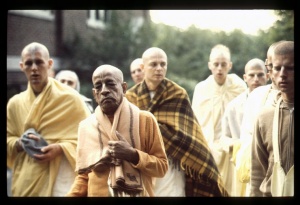CC Adi 5.112 (1975): Difference between revisions
(Vanibot #0027: CCMirror - Mirror CC's 1996 edition to form a basis for 1975) |
(Vanibot #0020: VersionCompareLinker - added a link to the Version Compare feature) |
||
| Line 2: | Line 2: | ||
<div style="float:left">'''[[Sri Caitanya-caritamrta (1975)|Śrī Caitanya-caritāmṛta (1975)]] - [[CC Adi (1975)|Ādi-līlā]] - [[CC Adi 5 (1975)|Chapter 5: The Glories Of Lord Nityānanda Balarāma]]'''</div> | <div style="float:left">'''[[Sri Caitanya-caritamrta (1975)|Śrī Caitanya-caritāmṛta (1975)]] - [[CC Adi (1975)|Ādi-līlā]] - [[CC Adi 5 (1975)|Chapter 5: The Glories Of Lord Nityānanda Balarāma]]'''</div> | ||
<div style="float:right">[[File:Go-previous.png|link=CC Adi 5.111 (1975)|Ādi-līlā 5.111]] '''[[CC Adi 5.111 (1975)|Ādi-līlā 5.111]] - [[CC Adi 5.113 (1975)|Ādi-līlā 5.113]]''' [[File:Go-next.png|link=CC Adi 5.113 (1975)|Ādi-līlā 5.113]]</div> | <div style="float:right">[[File:Go-previous.png|link=CC Adi 5.111 (1975)|Ādi-līlā 5.111]] '''[[CC Adi 5.111 (1975)|Ādi-līlā 5.111]] - [[CC Adi 5.113 (1975)|Ādi-līlā 5.113]]''' [[File:Go-next.png|link=CC Adi 5.113 (1975)|Ādi-līlā 5.113]]</div> | ||
{{CompareVersions|CC|Adi 5.112|CC 1975|CC 1996}} | |||
{{RandomImage}} | {{RandomImage}} | ||
==== TEXT 112 ==== | ==== TEXT 112 ==== | ||
| Line 32: | Line 31: | ||
<div class="purport"> | <div class="purport"> | ||
The Laghu-bhāgavatāmṛta | The Laghu-bhāgavatāmṛta gives the following description of the Viṣṇuloka within this universe, quoted from the Viṣṇu-dharmottara: "Above Rudraloka, the planet of Lord Śiva, is the planet called Viṣṇuloka, 400,000 miles in circumference, which is inaccessible to any mortal living being. Above that Viṣṇuloka and east of the Sumeru Hill is a golden island called Mahā-Viṣṇuloka, in the ocean of salt water. Lord Brahmā and other demigods sometimes go there to meet Lord Viṣṇu. Lord Viṣṇu lies there with the goddess of fortune, and it is said that during the four months of the rainy season He enjoys sleeping on that Śeṣa Nāga bed. East of Sumeru is the ocean of milk, in which there is a white city on a white island where the Lord can be seen sitting with His consort, Lakṣmījī, on a throne of Śeṣa. That feature of Viṣṇu also enjoys sleeping during the four months of the rainy season. The Śvetadvīpa in the milk ocean is situated just south of the ocean of salt water. It is calculated that the area of Śvetadvīpa is 200,000 square miles. This transcendentally beautiful island is decorated with desire trees to please Lord Viṣṇu and His consort." There are references to Śvetadvīpa in the Brahmāṇḍa Purāṇa, Viṣṇu Purāṇa, Mahābhārata and Padma Purāṇa, and there is the following reference in Śrīmad-Bhāgavatam ([[SB 11.15.18]]). | ||
śvetadvīpa-patau cittaṁ śuddhe dharma-maye mayi | :śvetadvīpa-patau cittaṁ | ||
dhārayañ chvetatāṁ yāti ṣaḍ-ūrmi-rahito naraḥ | :śuddhe dharma-maye mayi | ||
:dhārayañ chvetatāṁ yāti | |||
:ṣaḍ-ūrmi-rahito naraḥ | |||
"My dear Uddhava, you may know that My transcendental form of Viṣṇu in Śvetadvīpa is identical with Me in divinity. Anyone who places this Lord of Śvetadvīpa within his heart can surpass the pangs of the six material tribulations: hunger, thirst, birth, death, lamentation and illusion. Thus one can attain his original, transcendental form." | |||
</div> | </div> | ||
Latest revision as of 18:15, 26 January 2020

A.C. Bhaktivedanta Swami Prabhupada
TEXT 112
- sakala jīvera tiṅho haye antaryāmī
- jagat-pālaka tiṅho jagatera svāmī
SYNONYMS
sakala—all; jīvera—of the living entities; tiṅho—He; haye—is; antaḥ-yāmī—the Supersoul; jagat-pālaka—the maintainer of the material world; tiṅho—He; jagatera svāmī—the Lord of the material world.
TRANSLATION
He is the Supersoul of all living entities. He maintains this material world, and He is its Lord.
PURPORT
The Laghu-bhāgavatāmṛta gives the following description of the Viṣṇuloka within this universe, quoted from the Viṣṇu-dharmottara: "Above Rudraloka, the planet of Lord Śiva, is the planet called Viṣṇuloka, 400,000 miles in circumference, which is inaccessible to any mortal living being. Above that Viṣṇuloka and east of the Sumeru Hill is a golden island called Mahā-Viṣṇuloka, in the ocean of salt water. Lord Brahmā and other demigods sometimes go there to meet Lord Viṣṇu. Lord Viṣṇu lies there with the goddess of fortune, and it is said that during the four months of the rainy season He enjoys sleeping on that Śeṣa Nāga bed. East of Sumeru is the ocean of milk, in which there is a white city on a white island where the Lord can be seen sitting with His consort, Lakṣmījī, on a throne of Śeṣa. That feature of Viṣṇu also enjoys sleeping during the four months of the rainy season. The Śvetadvīpa in the milk ocean is situated just south of the ocean of salt water. It is calculated that the area of Śvetadvīpa is 200,000 square miles. This transcendentally beautiful island is decorated with desire trees to please Lord Viṣṇu and His consort." There are references to Śvetadvīpa in the Brahmāṇḍa Purāṇa, Viṣṇu Purāṇa, Mahābhārata and Padma Purāṇa, and there is the following reference in Śrīmad-Bhāgavatam (SB 11.15.18).
- śvetadvīpa-patau cittaṁ
- śuddhe dharma-maye mayi
- dhārayañ chvetatāṁ yāti
- ṣaḍ-ūrmi-rahito naraḥ
"My dear Uddhava, you may know that My transcendental form of Viṣṇu in Śvetadvīpa is identical with Me in divinity. Anyone who places this Lord of Śvetadvīpa within his heart can surpass the pangs of the six material tribulations: hunger, thirst, birth, death, lamentation and illusion. Thus one can attain his original, transcendental form."